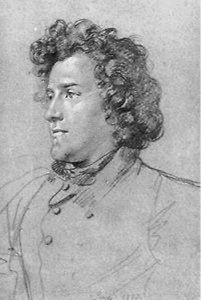Blessed world
(Poet's title: Selige Welt)
Set by Schubert:
D 743
[probably autumn 1822]
Ich treibe auf des Lebens Meer,
Ich sitze gemut in meinem Kahn,
Nicht Ziel noch Steuer, hin und her
Wie die Strömung reißt, wie die Winde gahn.
Eine selige Insel sucht der Wahn,
Doch eine ist es nicht.
Du lande gläubig überall an,
Wo sich Wasser an Erde bricht.
I am drifting on the sea of life,
I am sitting contentedly in my boat
I have neither destination nor rudder to steer the boat as I go here and there
As the current flows, as the winds blow.
Madness goes in search of a blessed island
But there is no such place.
You can land anywhere if you have faith,
Anywhere where water breaks on land.
All translations into English that appear on this website, unless otherwise stated, are by Malcolm Wren. You are free to use them on condition that you acknowledge Malcolm Wren as the translator and schubertsong.uk as the source. Unless otherwise stated, the comments and essays that appear after the texts and translations are by Malcolm Wren and are © Copyright.
☙
Themes and images in this text:
Boats By water – beaches and general Here and there Islands Journeys Madness On the water – rowing and sailing The sea Weaving Wind
From Homer onwards, there has been a tradition in Western thought that there must be either a single island or a group of islands where all is well: the Island(s) of the Blessed. In Plato the idea was associated with the afterlife, a sort of heaven, but in Plutarch’s life of Sertorius the islands were reported to be real places that could be reached by boat from the Straits of Gibraltar (the Canaries or Madeira, perhaps). In the late 11th century the monk Gaunilo (in a monastery in Tours, France) used the idea as part of his refutation of Anselm’s ontological argument for the existence of God. Anselm (Abbot of Bec and later to be Archbishop of Canterbury) had argued that only fools could believe that God did not exist (“The fool hath said in his heart, There is no God” Psalm 14:1) since the very idea of god involved his being perfect and a non-existent god by definition would not be perfect (an actual god is clearly better than a non-existent one). Gaunilo’s ‘In defence of the fool’ points out that the same argument can be applied to the mythical ‘Lost Island’: since this island is the happiest and most perfect place we can think of, by definition it must exist because a non-existent one would be less than perfect.
Senn is adamant, though: there is no such island and the idea that there might be (and that we should go off in search of it) is a sort of folly or madness. He asserts that he is happy to drift, to go where the current and the wind take him and step ashore anywhere that the boat makes landfall. The implication is that this approach to life bestows greater happiness than the fantastical dreams of reaching an ideal island. However, the poet could well be trying to persuade himself of the benefits of his current situation. As a young man he appears to have been an enthusiastic island seeker: he certainly got into trouble with the Austrian authorities, who suspected him of being a student activist and trouble-maker. He and four friends (including Schubert) were arrested on 20th January 1820, and Senn was eventually exiled from Vienna (to the Tyrol) for the rest of his life. We have to assume that the poem ‘Selige Welt‘ was part of Senn’s coming to terms with these traumatic events. He has to tell himself that his is now comfortable in the boat he finds himself in.
Report from High Commissioner of Police von Ferstl, March 1820 Concerning the stubborn and insulting behaviour evinced by Johann Senn, native of Pfunds in the Tyrol, on being arrested as one of the Freshmen Students' Association, on the occasion of the examination and confiscation of his papers carried out by regulation in his lodgings, during which he used the expressions, among others, that he "did not care a hang about the police," and further, that "the Government was too stupid to be able to penetrate into his secrets." It is also said that his friends, who were present, Schubert, the school assistant from the Rossau, and the law-student Streinsberg, as also the students who joined later, the undergraduate Zechenter from Cilli and the son of the wholesale dealer Bruchmann, law-student in the fourth year, chimed in against the authorized official in the same tone, inveighing against him with insulting and opprobrious language. The High Commissioner of Police reports this officially, in order that the excessive and reprehensible behaviour of the aforesaid may be suitably punished. The Chief Constable observes that this report will be taken into consideration during the proceedings against Senn; moreover, those individuals who have conducted themselves rudely towards the High Commissioner of Police during their visit to Senn will be called and severely reprimanded, and at the same time the Court Secretary Streinsberg as well as the wholesale dealer Bruchmann will be informed of their sons' conduct. From O.E. Deutsch (translated by Eric Blom), Schubert. A Documentary Biography London 1946 pp. 161 - 162
☙
Original Spelling Selige Welt Ich treibe auf des Lebens Meer, Ich sitze gemuth in meinem Kahn, Nicht Ziel, noch Steuer hin und her, Wie die Strömung reißt, wie die Winde gahn. Eine selige Insel sucht der Wahn, Doch eine ist es nicht. Du lande gläubig überall an, Wo sich Wasser an Erde bricht.
Note: Schubert received Senn’s poem in handwritten form. Senn did not publish it in any printed edition.


